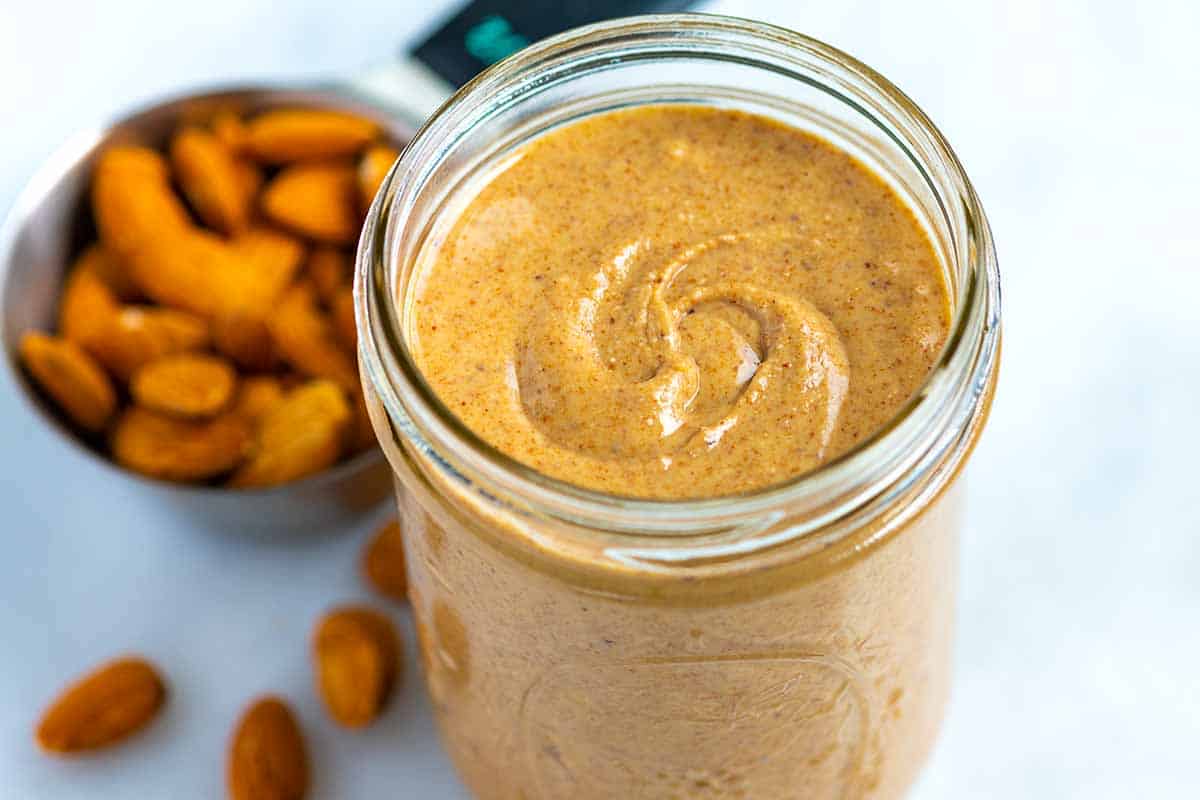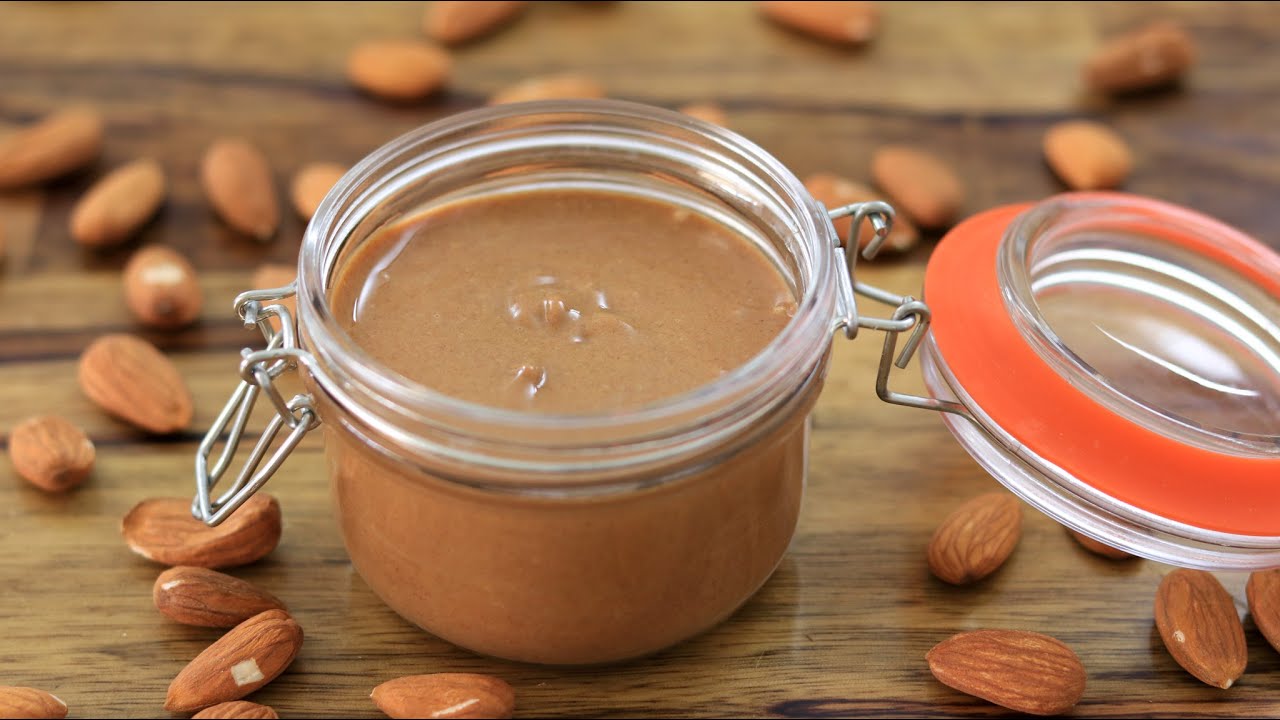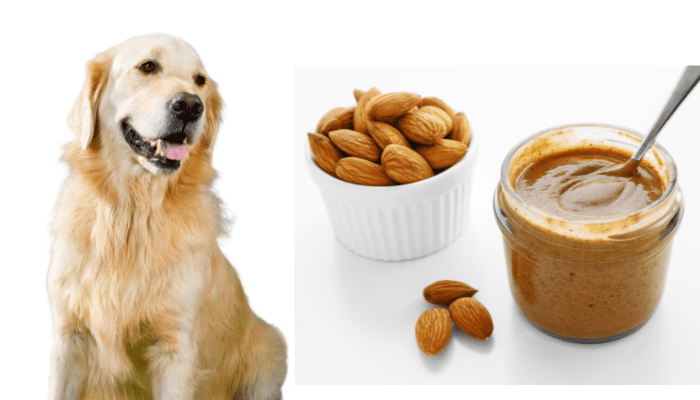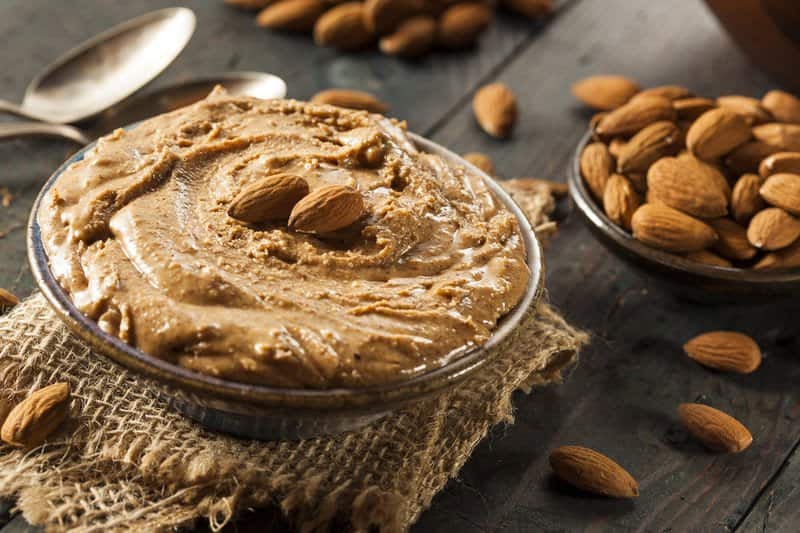Wondering if almond butter is a good snack choice for your dog? The short answer is yes. There are a few things you need to know though for the safety of your dog.
What is Almond Butter?
Almond butter is a delicious and nutritious snack for your dog that is packed with protein, healthy fats, vitamins, and minerals. It is an excellent energy source and can help your dog stay fueled throughout the day. Almond butter is also a good way to help your dog get their daily intake of fruits and vegetables.

Is Almond Butter Safe for Dogs?
It can be a healthy treat for your pup! Almond butter is a good source of protein, healthy fats, and vitamins and minerals like E and magnesium. However, not all dogs can digest almonds properly. Therefore, continue feeding your dog cautiously.
Look for almond butter that contains only ground raw or roasted almonds. Just be sure to choose almond butter that doesn’t have added sugar, salt, additives, or artificial sweeteners, such as the popular sweetener Xylitol, as these can harm dogs.
Benefits of Almond Butter for Dogs
Almond Butter is Good for the Coat
Almond butter is a good source of fatty acids essential for maintaining a healthy coat. The fats in almond butter can help moisturize the skin and coat, keeping your dog’s fur shiny and lustrous. In addition, the fatty acids in almond butter can help to reduce inflammation and soothe any existing skin conditions.
Almond Butter is a Good Source of Vitamins and Minerals
Just like humans, dogs need vitamins and minerals to stay healthy. Almond butter is a good source of vitamins A, E, and B, as well as magnesium, potassium, and calcium. These nutrients are essential for maintaining a healthy immune system, skeletal structure, and metabolism.
Almond Butter is Good for the Digestive System
The almond butter fiber can help keep your dog’s digestive system regular. In addition, the probiotics in almond butter can help to maintain healthy gut flora. A healthy digestive system is important for overall health and well-being.

Can My Dog Eat Almond Butter?
The short answer is yes, in moderation. However, almonds contain high fat and calories like all nuts, which can lead to weight gain if your dog overeats. In addition, the shells of almonds can cause digestive issues if swallowed. For these reasons, it’s important to only give your dog a small amount of almond butter as a treat and to ensure the almond butter you choose is unsalted and does not contain any added sugar.
Possible Side Effects of Almond Butter for Dogs
As with any food, a few potential side effects could occur if your dog overeats almond butter. The most common side effect is an upset stomach, which can lead to vomiting and diarrhea.
If your dog ingests a large amount of almond butter, it may also experience difficulty breathing and an increased heart rate. In severe cases, almond butter can even cause pancreatitis in dogs.
So it’s important to feed your dog almond butter in moderation and always consult with your veterinarian before giving it to them.

Can My Dog Eat Peanut Butter?
Dogs love peanut butter. Peanut butter is a good source of protein and healthy fats and can be a tasty way to boost your dog’s energy. In addition, it’s rare for dogs to have peanut allergies. Therefore, dogs can continue enjoying peanut butter in moderation.
You can find many pet food aisles filled with peanut butter flavored dog foods. Just be sure to choose a product that doesn’t contain Xylitol, a poisonous artificial sweetener for dogs.
When giving your peanut butter loving hound peanut butter, start with a small amount to see how they react. Some dogs are allergic to peanuts, so watch for any signs of digestive distress, such as vomiting or diarrhea. If your dog tolerates peanut butter well, you can safely give them a spoonful as a treat occasionally.

How about Cashew Butter?
While cashews are not toxic to dogs, they can cause stomach upset and other problems. This is because cashews contain a substance called persin, which is toxic to some animals. In small amounts, persin is not harmful to dogs, but feeding your dog, many roasted cashews can cause vomiting and diarrhea.
Additionally, cashews are high in fat, which can lead to weight gain and pancreatitis in some dogs. For these reasons, it is best to feed your dog only a few roasted cashews at a time. However, if your pet eats too many cashews, contact your veterinarian for advice on how to treat the symptoms.
What Are Other Nut Butters Not Safe for Dogs?
Macadamia Nut
This nut butter can harm your furry friend if ingested in large quantities. Macadamia nuts contain a toxin that can harm dogs if consumed in large quantities. The toxin affects the nervous system and can cause weakness, tremors, and paralysis. Symptoms usually appear within 12 hours of ingestion and can last up to 48 hours.
Pecan Butter
Pecans contain high fat and calories, which can harm dogs if they eat too many. The fat in pecans can also cause pancreatitis in dogs. Pancreatitis is a serious condition that occurs when the pancreas becomes inflamed.
Black Walnut Butter
Black walnuts contain a substance called juglone, which is toxic to dogs. Juglone can cause vomiting, diarrhea, and seizures in dogs. If your dog ingests black walnuts, it’s important to seek veterinary care immediately.

How Can I Incorporate Almond Butter Into My Dog’s Diet?
As pet parents, here are a few things to remember when incorporating almond butter into your dog’s diet.
- First, always check with your veterinarian before making any changes to your pet’s diet. They will be able to tell you if almond butter is a good option for your dog and how much to feed them.
- Second, when introducing new food to your pet, do so slowly and in small amounts. This will help prevent any upset stomach or other digestive issues.
The good news is that there are several easy ways to do so! Here are a few ideas:
- Add a spoonful of almond butter to your dog’s food at mealtime.
- Make homemade dog treats with almond butter as one of the main ingredients.
- Spread almond butter on a Kong toy or puzzle toy to keep your dog occupied and mentally stimulated.
- You can also use it as a treat by spreading it on a piece of fruit or top of their kibble.

Final Thoughts
Overall, almond butter is safe for dogs to eat in moderation. However, high fat and calories can be harmful if your dog overeats, so it’s important to only give them small amounts as a treat.
Always consult your veterinarian before giving your dog any new food, and start with a small amount to see how they react. Contact your veterinarian immediately if you suspect your dog has overeaten almond butter.
Frequently Asked Questions
WHAT HAPPENS IF MY DOG EATS ALMOND BUTTER?
Almond butter is great for humans, but not so much if you have a dog! It’s difficult to digest and can cause digestive distress. So please don’t feed your pup lots of this tasty treat often-it might make him sick.
HOW MUCH ALMOND BUTTER CAN A DOG EAT?
To keep your dog’s diet balanced and healthy, Bustamante recommends 1 tablespoon of almond butter for large dogs or one teaspoon if they’re small. While this isn’t toxic like other treats can be (since it has less fat), remember that the calories might become an issue, so instead, stick with brands tailored just towards pups.
WHAT CAN I GIVE MY DOG INSTEAD OF PEANUT BUTTER?
Cashews are a heart-healthy alternative to traditional dog treats, as they contain fats that help lower cholesterol. They also provide many important minerals like copper and magnesium.
WHAT IS BETTER FOR DOGS, PEANUT BUTTER OR ALMOND BUTTER?
Almond butter is an excellent addition to your dog’s diet. It keeps their fur healthy and shiny, and almond butter contains vitamin B3, which helps support the liver and eyesight! Plus they have high levels of Vitamin E – even higher than peanut butter–which removes harmful free radicals from cells while increasing immunity function.






